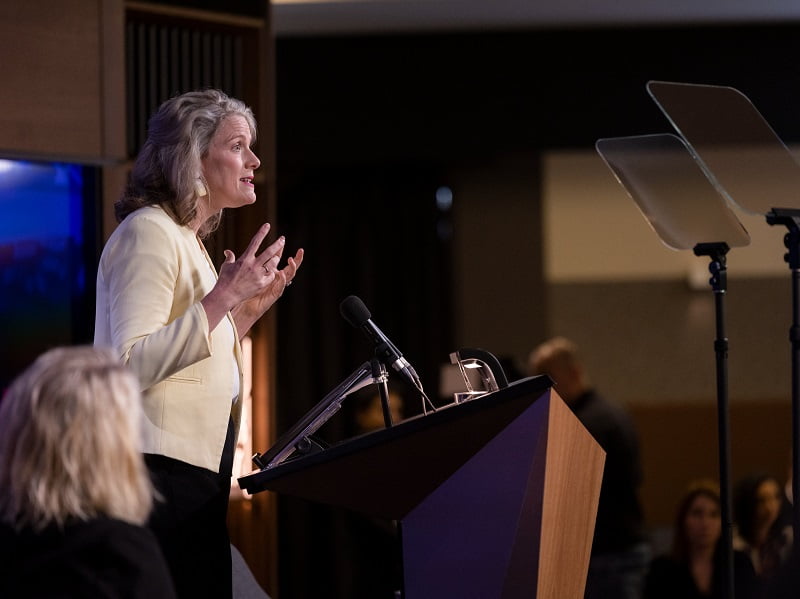A fast-tracked pathway for specialised, highly-skilled workers will be considered by the Albanese government as part of its simplification of the temporary skilled migration system after a review warned Australia is losing its competitive edge in the fight for global talent.
Speaking at the National Press Club on Thursday, Home Affairs minister Clare O’Neil set out the government’s plans to “fix the biggest problem” with a system described as “broken” by the migration review: its design.
The five-month review, released on Thursday, found that Australia’s migration program is no longer “fit for purpose” and “fails to attract the most highly skilled migrants and fails to enable business to efficiently access workers”.

The review cites research by Boston Consulting Group showing Australia ranked behind Canada, the United States and Germany for highly educated migrants, and behind Canada and the US for digital talents, higher-skilled labour and younger migrants.
Global competition for highly-skilled migrants is also increasing, with other countries, such the United Kingdom and Singapore, anticipating these changes by introducing new visa that target STEM roles.
“Australia will need to sharpen our permanent skilled migration settings to attract migrants able to meet future needs, maximise economic outcomes and capitalise on opportunities for growth in a changing economy,” the review states.
The panel, led by former secretary at Treasury and the Department of Prime Minister and Cabinet, Martin Parkinson, recommends overhauling the points test for the Skilled Independent program, which is “not well calibrated”, and providing a new temporary visa for highly-skilled young people.
On Thursday, O’Neil said a “fast, simple route for specialised, highly-skilled workers to drive innovation in our economy” is one of three new pathways for temporary skilled migrants now being considered and consulted on by the government.
She said that changes to the points test is also “absolutely critical”, describing the current bar as being “set too low”, and that getting the test “right could add tens of billion to the federal Budget over the next 30 years”.
A new area within the Home Affairs department has also been proposed to “identify skill needs in Australia’s economy, in concert with Jobs and Skills Australia within the Department of Employment and Workplace Relations.
“Under this proposal, we would go out into the world and find the migrants Australia needs, and talk to them about joining us on our national journey,” she said, adding that “Australia needs to enter the competition for global talent”.
The government has also committed to raising the minimum income threshold for employer sponsored visas, known as the Temporary Skilled Migration Income Threshold (TSMIT), for the first time since 2013, with the rate to climb from $53,900 to $70,000 on July 1.
The government’s plan has been welcomed by the Tech Council of Australia, with many of the proposed reforms “addressing many of the pain points that have long afflicted Australia’s tech sector”.
“We support the government’s decision to focus on creating faster and simpler pathways for highly-skilled and highly-paid workers needed to drive innovation in the economy,” Tech Council chief executive Kate Pounder said.
“It is these workers where there is a fierce global competition for talent, and where we need to be more competitive by creating a streamlined set of requirements that apply above a defined wage threshold.
“This is a welcome move, and we look forward to working with the Government to ensure the design of this streamlined pathway positions Australia to be truly competitively in bringing in tech talent compared to other nations.”
An overhaul of the Global Talent permanent visa scheme – first introduced to attract highly-skilled technologists in late 2019, before the program was widened to other “future-focused” sectors, has also been proposed by the review, but was not address by Ms O’Neil on Thursday.
Places offered through the Global Talent scheme have been progressively cut over the last year, first by the former Morrison government, and then by the Albanese government despite it lifting the overall migration cap. The intake now sits at 5,000 places, down from 15,000 at the start of 2022.
Changes to the Business Innovation & Investment Program (BIIP) is also on the cards, with the review suggesting the government give consideration to “whether the is retained as a substantial program” due to its “poor economic outcomes”.
This is unlike the permanent Employer Sponsored and Skilled Independent programs, which “perform well against all economic indicators and have delivered substantial benefits to Australia’s economy”.
“The BIIP is designed to attract investors, entrepreneurs and innovators. However, the outcomes for migrants entering under the program are weaker than in other streams and we are concerned the program may not be attracting migrants who will engage in the types and level of economic activity that the visa was designed to achieve,” the review said.
Do you know more? Contact James Riley via Email.

